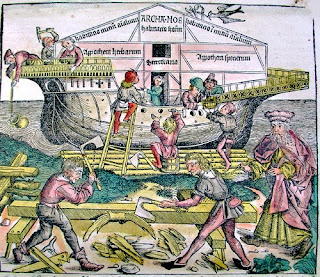
Alligators and Possums and Porcupines
Wilfred Funk’s Word Origins and Their Romantic Stories is always worth a look on a rainy, cool summer day in Knoxville.
Today I happened on his wonderful chapter on animal names and found several surprises. For instance, I knew that “crocodile,” being an old-world creature, was probably Greek, and it is: “krokodeilos” from “kroke,” “gravel,” and “drilos,” “worm.” But I didn’t know that the word “alligator” was also from a European language (since it is a New World creature). In Spanish, “lizard” is “el lagarto” (pronounced “el laharto”). The word went through several transformations and spellings before it settled on “alligator.” I mean, does that sound Spanish to you?
Here’s another surprise: the word “antler.” Surely that is not from a European language. Doesn’t sound like it, anyway. Turns out the stag’s horn, seeming to come out of the skull around the eye, was called “ante ocularem ramum,” or “the branch before the eye.” This descended into old French as “antoillier” (“oeil” being “eye” even in modern French) and thus to “antler.” Actually, I think Funk must be slightly wrong on this one, because the article “l’” should appear before oeil, which would make sense because the “l” sound is preserved in the word “antler.” If Funk’s derivation is correct, the modern word should be “anter,” which it ain’t.
Opossum is, as I think I have heard before, an Algonquian word, “apasum,” or “white beast.” The opossum is unfortunate in that it cannot hide in daylight because of its white color, so it “plays possum” to avoid predators. These creatures can be scary, as I discovered one time when I found one in a garbage can I had carelessly left without its top.
Porcupines were another surprise. The original name for this in French was “porc d’espine,” or “spiny pig.” This was brought into English as “porkepyn” apparently after the French dropped the “s” in “espine” and it became “epine” (there is a telltale accent mark over the first e in this word, but frankly, I don’t know how to make it. If you ever see an accent mark listing from left to right on a French word, it is quite possible that in older French an “s” was concealed therein.
You never know when this bit of information might prove useful.
